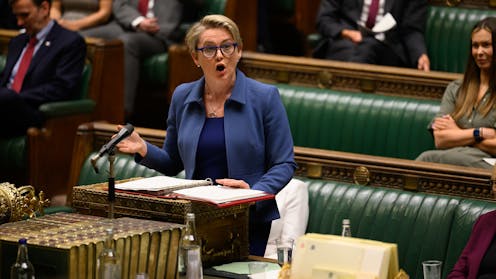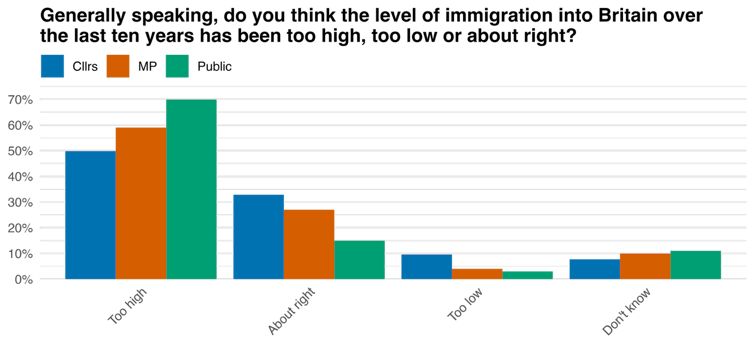
The UK government has unveiled plans to reform the migration system, making it more restrictive with the aim of reducing the level of net migration into Britain.
Immigration provides economic opportunities for a country – for example, migration enables employers to recruit the workers they need. This is particularly true in essential but low-paid sectors such as social care and agriculture. Reducing net migration may mean trading off some of these economic benefits.
The UK government’s official economic forecaster, the Office for Budget Responsibility, tends to assume that higher net migration has a positive impact on economic growth and tax receipts.
It is notable, then, that a government elected to make economic growth its primary mission, which has struggled to keep the public finances in line with its fiscal rules, is making policy choices that could make both objectives more challenging. Some have argued that the government’s immigration plans are a sign it has abandoned its goal of boosting economic growth above all other objectives.
We have just published new research that partly explains this decision. We conducted a survey of 103 MPs and 1,757 local councillors, and compared the attitudes of British politicians with those of members of the public.
We polled Westminster MPs on what they think about the level of migration into the UK. The timing of this polling matched up exactly with a public poll YouGov had conducted. This enabled us to draw a direct comparison between the two groups.
We found that broadly, MPs and the public are in agreement on this issue. Both clearly tend to think immigration has been too high in recent years. However, the public (70% support) are even more inclined towards this view than MPs (just under 60% support), and less likely than MPs to think that immigration levels have been “about right” in recent years.

Despite these results, the long-term trend on public attitudes to migration has moved in a more liberal direction. Over decades, the British public has generally become more positive about the benefits of migration.
However, this is complicated by the fact that anti-immigration voters are often more exercised about the issue than pro-immigration voters. Anti-immigration voters are also more efficiently distributed across a large number of constituencies, whereas more liberal pro-immigration voters are often more concentrated in seats in larger cities.
Reform UK’s performance in the recent local elections demonstrates the electoral potency of anti-immigration sentiment among some voters.
Read more: What Britons and Europeans really think about immigration – new analysis
Growth at all costs?
Ipsos also recently published some interesting polling of MPs and the public. This showed that when it comes to issues such as increased housebuilding and immigration, MPs tended to be more willing than the public to prioritise boosting economic growth over other objectives (such as limiting immigration). Although, MPs were more willing than the public to prioritise protecting the environment over economic growth.
When Labour was elected into government in 2024, Keir Starmer emphasised the party’s focus on boosting growth. A whole tranche of new Labour MPs were elected with an apparent commitment to this, and many subsequently joined the Labour Growth Group caucus.
Want more politics coverage from academic experts? Every week, we bring you informed analysis of developments in government and fact check the claims being made.
Sign up for our weekly politics newsletter, delivered every Friday.
Such a shift in the composition of who is in the Westminster parliament has enabled substantial policy shifts in a pro-growth direction. For example, some recent Conservative prime ministers would arguably have liked to implement the type of reforms in the current government’s planning and infrastructure bill, but were unable to principally because of resistance among their backbench MPs.
However, as we’ve explained, polling shows that the public is not always as willing as the current crop of MPs to sign up to things just because they might boost economic growth. There is also a substantial section of the population who would like to see immigration reduced.
The government’s new white paper setting out its proposed immigration reforms eschews a simple relationship between higher immigration and greater economic prosperity. It emphasises the difference between boosting overall GDP and the size of the labour market versus productivity and per capita GDP, and criticises an economic model reliant on record levels of net migration into the UK.
Nonetheless, it appears that Labour has diluted its attempt to govern in a purely pro-growth manner in order to respond to public opinion.
Mitya Pearson the University of Warwick. He has received funding from the British Academy and Leverhulme Trust.
David Jeffery does not work for, consult, own shares in or receive funding from any company or organisation that would benefit from this article, and has disclosed no relevant affiliations beyond their academic appointment.
This article was originally published on The Conversation. Read the original article.







